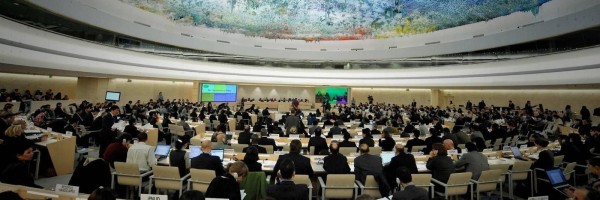On 26 June, during the 41st session of the UN Human Rights Council (HRC), 40 human rights organisations, including ALQST, published a letter calling on UN Member States to adopt a UN mechanism to monitor the ongoing human rights violations in Saudi Arabia, and urging the Saudi authorities to immediately and unconditionally release all those arbitrarily detained, abolish the male guardianship system, and establish an immediate moratorium on the use of the death penalty.
The letter begins: “We remain highly concerned about the human rights situation in Saudi Arabia, in particular the recent mass executions of 37 men on 23 April, the continued arbitrary detention of human rights defenders including women human rights defenders and the ongoing impunity for serious human rights violations, including torture.”
The organisations welcomed the joint statement that was passed by 36 states at the last HRC session in March, which expressed its strong concern over the human rights situation in the country, in particular the arbitrary detention of human rights defenders, including women’s rights activists. The letter notes that this pressure led to some positive human rights outcomes, such as the provisional release of some of the women activists.
But there have also been further repressive developments since, including the women's rights activists being brought to trial on charges relating to their human rights activism, the arrest of at least 14 bloggers, writers and family members of women human rights defenders, and the mass execution of 37 men, including some who were minors when they allegedly carried out their crimes and many who had been tortured into confessing. These developments underline that scrutiny of Saudi Arabia's human rights record must be sustained.
The letter was published on 26 June, the day in which the Special Rapporteur Agnes Callamard presented to the UN Human Rights Council her findings into the killing of Saudi journalist Jamal Khashoggi. The report, which found that Khashoggi was the "victim of a premeditated extrajudicial execution”, “overseen, planned and endorsed” by the State, ties into the wider climate of impunity in Saudi Arabia which enabled the crime and the authorities' total crackdown on all dissent.
It is in light of this, and the fact that human rights violations in Saudi Arabia, including the Khashoggi killing, mass executions and the detention and torture of activists, are not isolated cases but rather form part of a pattern of gross and systematic rights violations, that the 40 human rights organisations including ALQST announced their call for UN Member States to adopt a resolution addressing the ongoing human rights violations. The organisations envisage such a resolution being introduced at the HRC’s 42nd session in September. But it will first require significant advocacy efforts at the national, regional and international level.
The full letter can be read here.




